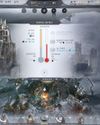As the mainstream industry moves onto pastures new, what does the future hold for the shadowy genre known as the immersive simulation?

Since 2011, PC gaming has been blessed with an incredible second wave of high-concept, high-budget immersive sims. Starting with Deus Ex: Human Revolution, the last few years have seen two Deus Ex games, two Dishonored games, a new Thief game, and Prey, which for all intents and purposes is a spiritual successor to System Shock. All of these games embrace the ideals that made Deus Ex, Thief, and System Shock so striking in the ’90s—emergent play, player agency and complex level design—reforged with new aesthetics and exploring different ideas and themes.
It’s been a wonderful ride, but that second wave is now coming to an end. Square Enix has shelved Deus Ex for the foreseeable future, and the less-than-stellar sales of both Dishonored 2 and Prey means the future of Bethesda’s immersive sims is currently uncertain. We shouldn’t be too sad—it’s remarkable that these games were made in the first place— but it does leave us with the question of what the future holds for the immersive sim.
The short answer is the future is hugely exciting. For the longer answer, we need to go back to where the immersive sim began.
IMMERSIVE ORIGINS
“I’ve been in the industry long enough that you see these trends come and go, certain genres become hot for a few years, and then they tend to fade and something else pops up,” explains Paul Neurath, founder of OtherSide Entertainment and creative director of UnderworldAscendant. “I think any of these genres has potential to be quite popular and quite successful. Certainly, fantasy RPGs have been around since the start of gaming, and I think will be around for quite a lot longer.”
This story is from the {{IssueName}} edition of {{MagazineName}}.
Start your 7-day Magzter GOLD free trial to access thousands of curated premium stories, and 9,000+ magazines and newspapers.
Already a subscriber ? Sign In
This story is from the {{IssueName}} edition of {{MagazineName}}.
Start your 7-day Magzter GOLD free trial to access thousands of curated premium stories, and 9,000+ magazines and newspapers.
Already a subscriber? Sign In

"The War Within itself has kept me coming back most evenings too"
WORLD OF WARCRAFT remains my jailer, and I couldn't be more pleased about it

OK BUILDER
SATISFACTORY is the new titan in building and crafting games

HELL YES
DIABLO IV: VESSEL OF HATRED is a transformative expansion

MOUSE: PI FOR HIRE
This mouse wants to be more than just a gimmick

WINDBLOWN
Dead Cells dev's new roguelike has me afraid for my free time

NO MORE ROOM IN HELL 2
As the zombie horde surrounded me just moments after taking down my two remaining teammates, the writing was really on the wall. Armed with just a chef's knife, it was clear I stood no chance, but I was going down swinging, hoping for a miracle... it didn't come.

OWNED BY STEAM
VALVE cordially reminds you that your games aren't yours

CURSE OF THE AZURE BONDS
These classic games haven't aged badly, but I sure have.

DEEP FREEZE
Endure a blizzard of tough choices and rough consequences in FROSTPUNK 2

NEW HORIZONS
Building up REMNANT 2 outside the live service game grinder